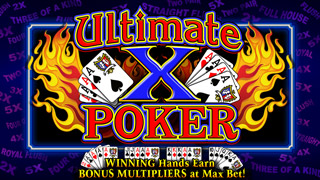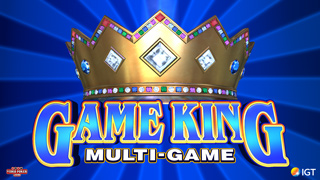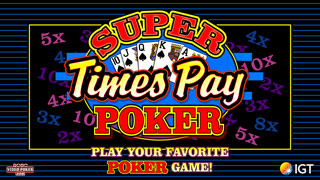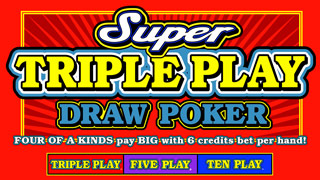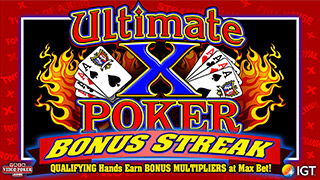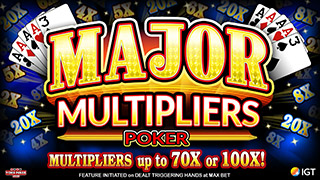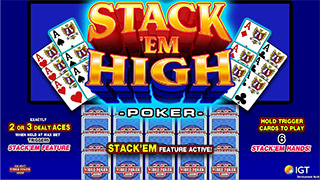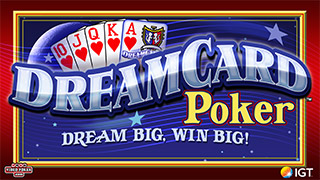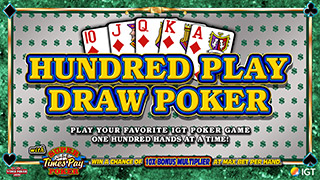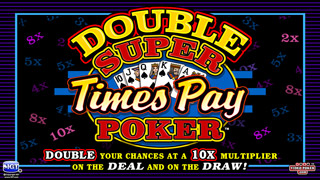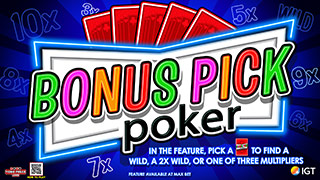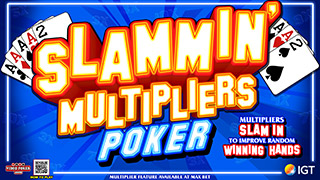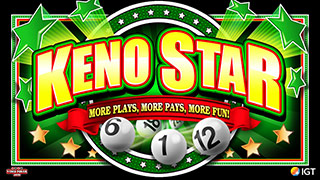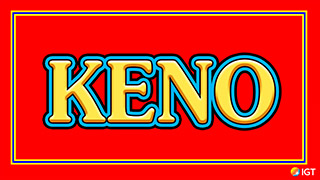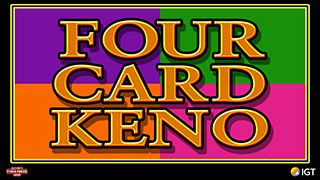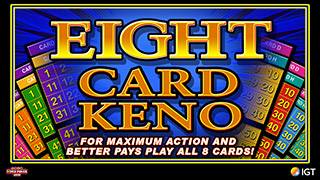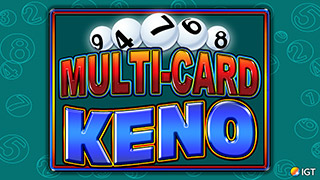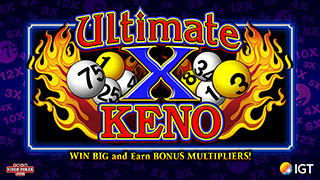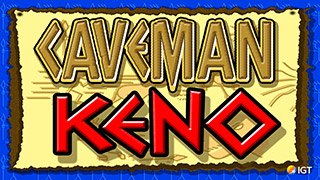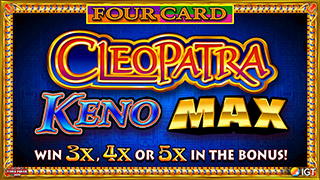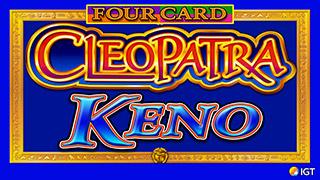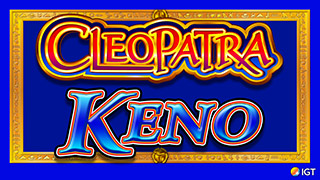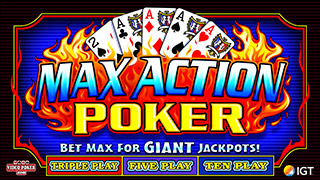For what it's worth.
-
MikeA
- Video Poker Master
- Posts: 1615
- Joined: Tue Oct 24, 2006 3:50 pm
Re: For what it's worth.
There is no need to dilute this discussion on strategy with your debate with Shadowman.
I am not trying to discredit you. I admit that I am biased towards the mathmetical approach and simply do not understand your logic and am trying to do so in order to come to my own conclusions about a different approach to VP.
According to my calculations, that KKxxx (no holding for a flush or straight) shows only a 6 coin advantage to holding the pair of Kings. That a far less risk of losing than losing a potential 150 coin expectation by throwing away the 9 and going for a royal after being dealt a King-high straight flush. In fact, it is in the same basic category as throwing away the pair of 8's in a 2288x hand or holding only the A in a AQJxx hand, yet you do not do this!
I am obviously missing a critical piece to this approach of yours.
As you should be able to deduce by now, I am simply trying to back into your parameters for making the unorthodox play. My profession as a programmer on mainframe computers requires that I derive conclusions based on minimal amounts of evidence. I've been doing it for 38 years now but apparently, I have not gathered the critical number of elements to derive that which you promote.
I do appreciate the dialog here though.
I am not trying to discredit you. I admit that I am biased towards the mathmetical approach and simply do not understand your logic and am trying to do so in order to come to my own conclusions about a different approach to VP.
According to my calculations, that KKxxx (no holding for a flush or straight) shows only a 6 coin advantage to holding the pair of Kings. That a far less risk of losing than losing a potential 150 coin expectation by throwing away the 9 and going for a royal after being dealt a King-high straight flush. In fact, it is in the same basic category as throwing away the pair of 8's in a 2288x hand or holding only the A in a AQJxx hand, yet you do not do this!
I am obviously missing a critical piece to this approach of yours.
As you should be able to deduce by now, I am simply trying to back into your parameters for making the unorthodox play. My profession as a programmer on mainframe computers requires that I derive conclusions based on minimal amounts of evidence. I've been doing it for 38 years now but apparently, I have not gathered the critical number of elements to derive that which you promote.
I do appreciate the dialog here though.
-
babybubba
- Senior Member
- Posts: 291
- Joined: Fri Apr 20, 2007 9:18 pm
According to my calculations, that KKxxx (no holding for a flush or straight) shows only a 6 coin advantage to holding the pair of Kings. That a far less risk of losing than losing a potential 150 coin expectation by throwing away the 9 and going for a royal after being dealt a King-high straight flush. In fact, it is in the same basic category as throwing away the pair of 8's in a 2288x hand or holding only the A in a AQJxx hand, yet you do not do this!
As you should be able to deduce by now, I am simply trying to back into your parameters for making the unorthodox play. My profession as a programmer on mainframe computers requires that I derive conclusions based on minimal amounts of evidence. I've been doing it for 38 years now but apparently, I have not gathered the critical number of elements to derive that which you promote.
The point made about the shadow was pertinent in that his behavior explicitly explains the desire for he and them to remain ignorant of my strategy so they can continue to criticize it in support of their own agendas. I recognize you're not trying to discredit me, and you should recognize that I see that.
I'm not sure I follow what you're saying about the KKXXX. Assuming the XXX is nothing, I don't even consider holding anything other than the KK. Throwing the 9 in a K-hi SF is only done when the SF won't attain a mini-win or overall session win goal, and since it does attain the goal more often than it doesn't, using long-term applications to prove a point is irrelevant. I'm a little confused on your last stmt. also on the 8822X. Some of it may be due to the fact that these special plays are dictated by their relationship to attaining goals and you may be applying the rules as if the plays are always used. ??
-
MikeA
- Video Poker Master
- Posts: 1615
- Joined: Tue Oct 24, 2006 3:50 pm
Okay, that's out of the way...as long as we understand that this is about strategy and not discredit or endorsement.
Needs must I explain. When programming a software routine or when debugging one, one must stipulate all the possibilities for as we in the business know, if a user can do something, he eventually will therefore we have to make the routine bullet-proof. I stipulated that there were no flush or straight draws for that would have confused the issue with the KKxxx hand. For instance, had one of the cards being discarded been the nine of the same suit as the King being held, then there might have been some temptation to hold it to improve odds on drawing to a straight flush. The example was purely to illustrate holding one King or the pair of Kings without any advantage to holding any of the other three cards. In such a decision, there is only a 6 coin difference in probabilities of making a better hand by holding one King over holding both Kings. And, by holding both Kings, you eliminate any remote possibility of drawing to a Royal. (Hold both EV 7.23 coin. Hold 1 King 1.65 EV...diff in value 5.58 rounded to 6). By the way, I never thought you would hold just the one King in that hand. I just wanted to find out whether or not the difference between Expected Value for the two possibilities could have been the driving factor in your strategy.
In other words, I was trying to parametrize your decision making by bracketing it with the risk factor. I'm having a lot of trouble defining those parameters. With what I now know about your tactics (or is strategy the better term?), I could not come close to writing any kind of simulation that would evaluate it for me were that my intent. I certainly do not know enough about it to attempt to employ it in play or practice sessions.
Goals driven decisions. I can equate a bit to that and it certainly seems to be a driving force behind your strategy.
Now, example time again. You have a win goal and you are 100 credits away from it. You are dealt a 99988. The 50 credit Full House will not get you there but quad 9's will. Do you go for the quad? If it were trip "A" with the 8's I'd go for the quad because of the bonus. But I wouldn't go for it with the 9's or any 2-K on the trips. Seems like winning the 50 coin Full House would give me better options later in the session with extra hands to get a better shot at the quads with less risk. (FH hold 50 versus 27.16 for trip hold with 5-K's) (for the trip 2-4 it would be 50 for the Full House and 37.99 for the trips) (for the trip Aces it would be 63.89 for the trips and 50 for the Full house so this would be the only one I'd hold the trips with)
Again, here I am trying to establish what the parameters are that dictate for you when to deviate from Basic Strategy. You mentioned that you had stuff written down on paper all over the place. But when you derived the strategy initially, you had to have had some logic or consistent process in mind as you came up with the deviations.
Decisions in Video Poker or in Blackjack can certainly be programmed into a routine via a table such as your 1700 deviations however, it is a VERY inefficient method. Far better to devise a routine that will calculate a correct answer given any possible combination of the 52 variables involved.
(the following is for those reading along, not familiar with programming techniques)
With simulations, certainly tables could be employed to give the best possible play in any situation, but that isn't practical. You would have to have a NASA Computer with its mainframe's capacity of memory to house such an almost infinite number of possible plays. The better simulations don't employ tables of course. They employ formulas that project probabilities for each hand and assign Expected Value based on the results. From that, one can see not only what the best potential hand is to hold, but can also see just how much better it is by probabilities, than any other possible combination of held cards in that initial draw.
Decisions in a Poker Simulation, should be Objective rather than Subjective since you are dealing (no pun intended) with a consistently structured set of input and a consistent extraction of variables from that structure. I.e., you always have 52 cards and you are always dealt 5 out of that 52 with that 5 not eligible for redraw until the next hand. Long term and Short term really have nothing to do with this. The PROBABILITY is a consistent derivative. It's not equal, but it's consistent. By that I mean that you are going to have a better chance of improving your hand for maximum gain most often if you hold one way versus another. Probabilities will point out which is the best way most of the time for maximum gain on that particular hand.
Even the "math folks" take calculated risks because the odds on making a hand are factored into Basic Strategy. If these risks of loss versus win were not built into the strategy, everyone might be justified to go for any possible Royal Flush draw at the expense of any other winning possibility.
Don't laugh! I have a friend (who plays mostly Let-It-Ride) who will throw away anything in the hand if he has at least two cards to a Royal! Over a long period of time, he'll hit more Royals than I will because he goes for them more often, but I'll lose less often and win more often than he because he will not get nearly as many smaller hand wins as do I. Okay, I've never seen him throw away a dealt pat hand other than two pair, but he will draw to virtually nothing but Royals.
The point made about the shadow was pertinent in that his behavior explicitly explains the desire for he and them to remain ignorant of my strategy so they can continue to criticize it in support of their own agendas. I recognize you're not trying to discredit me, and you should recognize that I see that.
I'm not sure I follow what you're saying about the KKXXX. Assuming the XXX is nothing, I don't even consider holding anything other than the KK. Throwing the 9 in a K-hi SF is only done when the SF won't attain a mini-win or overall session win goal, and since it does attain the goal more often than it doesn't, using long-term applications to prove a point is irrelevant. I'm a little confused on your last stmt. also on the 8822X. Some of it may be due to the fact that these special plays are dictated by their relationship to attaining goals and you may be applying the rules as if the plays are always used. ??
Needs must I explain. When programming a software routine or when debugging one, one must stipulate all the possibilities for as we in the business know, if a user can do something, he eventually will therefore we have to make the routine bullet-proof. I stipulated that there were no flush or straight draws for that would have confused the issue with the KKxxx hand. For instance, had one of the cards being discarded been the nine of the same suit as the King being held, then there might have been some temptation to hold it to improve odds on drawing to a straight flush. The example was purely to illustrate holding one King or the pair of Kings without any advantage to holding any of the other three cards. In such a decision, there is only a 6 coin difference in probabilities of making a better hand by holding one King over holding both Kings. And, by holding both Kings, you eliminate any remote possibility of drawing to a Royal. (Hold both EV 7.23 coin. Hold 1 King 1.65 EV...diff in value 5.58 rounded to 6). By the way, I never thought you would hold just the one King in that hand. I just wanted to find out whether or not the difference between Expected Value for the two possibilities could have been the driving factor in your strategy.
In other words, I was trying to parametrize your decision making by bracketing it with the risk factor. I'm having a lot of trouble defining those parameters. With what I now know about your tactics (or is strategy the better term?), I could not come close to writing any kind of simulation that would evaluate it for me were that my intent. I certainly do not know enough about it to attempt to employ it in play or practice sessions.
Goals driven decisions. I can equate a bit to that and it certainly seems to be a driving force behind your strategy.
Now, example time again. You have a win goal and you are 100 credits away from it. You are dealt a 99988. The 50 credit Full House will not get you there but quad 9's will. Do you go for the quad? If it were trip "A" with the 8's I'd go for the quad because of the bonus. But I wouldn't go for it with the 9's or any 2-K on the trips. Seems like winning the 50 coin Full House would give me better options later in the session with extra hands to get a better shot at the quads with less risk. (FH hold 50 versus 27.16 for trip hold with 5-K's) (for the trip 2-4 it would be 50 for the Full House and 37.99 for the trips) (for the trip Aces it would be 63.89 for the trips and 50 for the Full house so this would be the only one I'd hold the trips with)
Again, here I am trying to establish what the parameters are that dictate for you when to deviate from Basic Strategy. You mentioned that you had stuff written down on paper all over the place. But when you derived the strategy initially, you had to have had some logic or consistent process in mind as you came up with the deviations.
Decisions in Video Poker or in Blackjack can certainly be programmed into a routine via a table such as your 1700 deviations however, it is a VERY inefficient method. Far better to devise a routine that will calculate a correct answer given any possible combination of the 52 variables involved.
(the following is for those reading along, not familiar with programming techniques)
With simulations, certainly tables could be employed to give the best possible play in any situation, but that isn't practical. You would have to have a NASA Computer with its mainframe's capacity of memory to house such an almost infinite number of possible plays. The better simulations don't employ tables of course. They employ formulas that project probabilities for each hand and assign Expected Value based on the results. From that, one can see not only what the best potential hand is to hold, but can also see just how much better it is by probabilities, than any other possible combination of held cards in that initial draw.
Decisions in a Poker Simulation, should be Objective rather than Subjective since you are dealing (no pun intended) with a consistently structured set of input and a consistent extraction of variables from that structure. I.e., you always have 52 cards and you are always dealt 5 out of that 52 with that 5 not eligible for redraw until the next hand. Long term and Short term really have nothing to do with this. The PROBABILITY is a consistent derivative. It's not equal, but it's consistent. By that I mean that you are going to have a better chance of improving your hand for maximum gain most often if you hold one way versus another. Probabilities will point out which is the best way most of the time for maximum gain on that particular hand.
Even the "math folks" take calculated risks because the odds on making a hand are factored into Basic Strategy. If these risks of loss versus win were not built into the strategy, everyone might be justified to go for any possible Royal Flush draw at the expense of any other winning possibility.
Don't laugh! I have a friend (who plays mostly Let-It-Ride) who will throw away anything in the hand if he has at least two cards to a Royal! Over a long period of time, he'll hit more Royals than I will because he goes for them more often, but I'll lose less often and win more often than he because he will not get nearly as many smaller hand wins as do I. Okay, I've never seen him throw away a dealt pat hand other than two pair, but he will draw to virtually nothing but Royals.
The point made about the shadow was pertinent in that his behavior explicitly explains the desire for he and them to remain ignorant of my strategy so they can continue to criticize it in support of their own agendas. I recognize you're not trying to discredit me, and you should recognize that I see that.
I'm not sure I follow what you're saying about the KKXXX. Assuming the XXX is nothing, I don't even consider holding anything other than the KK. Throwing the 9 in a K-hi SF is only done when the SF won't attain a mini-win or overall session win goal, and since it does attain the goal more often than it doesn't, using long-term applications to prove a point is irrelevant. I'm a little confused on your last stmt. also on the 8822X. Some of it may be due to the fact that these special plays are dictated by their relationship to attaining goals and you may be applying the rules as if the plays are always used. ??
-
denflo60
- Forum Rookie
- Posts: 16
- Joined: Thu Nov 09, 2006 6:29 pm
Baby Bubba and Mike A:
I have rarely seen a person bad mouthed in this arena as much as Fa La La La La.... La la la la. I don't know the man, but in my opinion he is one of very few whose methodology stimulates a discussion like the one that you two folks are having and that is great for the video poker. Two sane people differring in methodogies and approaches to the game.
I have read all the VP material of the last 8 years or so: both sides of this discussion. I play either $1. 100 way or $25 single play machines. Last couple of years I've done OK. Wins and losses add up quickly at these denomination so I take my play methodology seriously and have won and lossed 6 figures on different trips to Vegas. I offer a few comments.
When you have a short run plan, I believe it enhances your chances of coming home from a trip a winner. Whether you agree or disagree with Fa La La La La.... La la la la, discipline is part of his methodology. You require a very large bankroll with Fa La La La La.... La la la la's methodology and you must be free of fear to play his way. Losses can be huge before you hit a positive excursion and may exhaust even the biggest bankroll this side of infinty if a negative excursion is long enough. That said, there are short term random excursions both positive and negative in video poker. If you read Nicholas Taleb"s "Black Swan" books and played enough VP, you have to ask yourself how long does the short run go before the law of large numbers turns your play into a Gaussian Bell curve? Can you take advantage of this question alter your play amounts or number of hand amounts in multiplay, to do better than the long term suggests. In the extreme can you change the type of game you're playing in a session into the mix? If I was a youngster and had a doctoral candidate slave and infinite computer power, this would make a great PHD thesis. I think you really need this kind of study before you can definitively prove whether the short run Fa La La La La.... La la la la methodology is superior or not to the long term eupemistically called advantage player philosophy. You could write one hell of a book on the subject. Denny
I have rarely seen a person bad mouthed in this arena as much as Fa La La La La.... La la la la. I don't know the man, but in my opinion he is one of very few whose methodology stimulates a discussion like the one that you two folks are having and that is great for the video poker. Two sane people differring in methodogies and approaches to the game.
I have read all the VP material of the last 8 years or so: both sides of this discussion. I play either $1. 100 way or $25 single play machines. Last couple of years I've done OK. Wins and losses add up quickly at these denomination so I take my play methodology seriously and have won and lossed 6 figures on different trips to Vegas. I offer a few comments.
When you have a short run plan, I believe it enhances your chances of coming home from a trip a winner. Whether you agree or disagree with Fa La La La La.... La la la la, discipline is part of his methodology. You require a very large bankroll with Fa La La La La.... La la la la's methodology and you must be free of fear to play his way. Losses can be huge before you hit a positive excursion and may exhaust even the biggest bankroll this side of infinty if a negative excursion is long enough. That said, there are short term random excursions both positive and negative in video poker. If you read Nicholas Taleb"s "Black Swan" books and played enough VP, you have to ask yourself how long does the short run go before the law of large numbers turns your play into a Gaussian Bell curve? Can you take advantage of this question alter your play amounts or number of hand amounts in multiplay, to do better than the long term suggests. In the extreme can you change the type of game you're playing in a session into the mix? If I was a youngster and had a doctoral candidate slave and infinite computer power, this would make a great PHD thesis. I think you really need this kind of study before you can definitively prove whether the short run Fa La La La La.... La la la la methodology is superior or not to the long term eupemistically called advantage player philosophy. You could write one hell of a book on the subject. Denny
-
bigboy
- Senior Member
- Posts: 389
- Joined: Tue Sep 05, 2006 9:03 pm
Baby Bubba and Mike A:
I have rarely seen a person bad mouthed in this arena as much as Fa La La La La.... La la la la. I don't know the man, but in my opinion he is one of very few whose methodology stimulates a discussion like the one that you two folks are having and that is great for the video poker. Two sane people differring in methodogies and approaches to the game.
I have read all the VP material of the last 8 years or so: both sides of this discussion. I play either $1. 100 way or $25 single play machines. Last couple of years I've done OK. Wins and losses add up quickly at these denomination so I take my play methodology seriously and have won and lossed 6 figures on different trips to Vegas. I offer a few comments.
When you have a short run plan, I believe it enhances your chances of coming home from a trip a winner. Whether you agree or disagree with Fa La La La La.... La la la la, discipline is part of his methodology. You require a very large bankroll with Fa La La La La.... La la la la's methodology and you must be free of fear to play his way. Losses can be huge before you hit a positive excursion and may exhaust even the biggest bankroll this side of infinty if a negative excursion is long enough. That said, there are short term random excursions both positive and negative in video poker. If you read Nicholas Taleb"s "Black Swan" books and played enough VP, you have to ask yourself how long does the short run go before the law of large numbers turns your play into a Gaussian Bell curve? Can you take advantage of this question alter your play amounts or number of hand amounts in multiplay, to do better than the long term suggests. In the extreme can you change the type of game you're playing in a session into the mix? If I was a youngster and had a doctoral candidate slave and infinite computer power, this would make a great PHD thesis. I think you really need this kind of study before you can definitively prove whether the short run Fa La La La La.... La la la la methodology is superior or not to the long term eupemistically called advantage player philosophy. You could write one hell of a book on the subject. Denny
I wonder what the odds are that two posters (denflo60 and harpo777), both identifying themselves as "Denny", could be in total agreement about a theory/strategy that is not published???
-
denflo60
- Forum Rookie
- Posts: 16
- Joined: Thu Nov 09, 2006 6:29 pm
Bigboy: Who is Harpo777, it is not this Denny. What did he have to say? Denny
-
Webman
- Video Poker Master
- Posts: 5217
- Joined: Wed Jul 13, 2005 5:00 pm
As far as I can tell, harpo did not call himself Denny (at least not here). I think you are mistaken, bigboy.
denflo60 has been around since before harop or babybubba.
denflo60 has been around since before harop or babybubba.
-
bigboy
- Senior Member
- Posts: 389
- Joined: Tue Sep 05, 2006 9:03 pm
As far as I can tell, harpo did not call himself Denny (at least not here). I think you are mistaken, bigboy.
denflo60 has been around since before harop or babybubba.
Re-read the 1st line of Harpo777's second post.
denflo60 has been around since before harop or babybubba.
Re-read the 1st line of Harpo777's second post.
-
Webman
- Video Poker Master
- Posts: 5217
- Joined: Wed Jul 13, 2005 5:00 pm
Ah, it's in his second post actually. I stand corrected. About the name any way.
My name is Denny. Many of you may have the time to both read and post constantly, but I have a full time job that requires most of my efforts. I have been reading this forum since last fall as I have VPFRee and some others. I haven't had anything to contribute since I'm only an expert on Contract Administration . . .
Good investigation, bigboy. In any event, the forum software is pretty good at telling me when an account is a duplicate for the same user ( ) and that does not appear to be the case with denflo60 and Mr. Harpo.
My name is Denny. Many of you may have the time to both read and post constantly, but I have a full time job that requires most of my efforts. I have been reading this forum since last fall as I have VPFRee and some others. I haven't had anything to contribute since I'm only an expert on Contract Administration . . .
Good investigation, bigboy. In any event, the forum software is pretty good at telling me when an account is a duplicate for the same user ( ) and that does not appear to be the case with denflo60 and Mr. Harpo.
-
bigboy
- Senior Member
- Posts: 389
- Joined: Tue Sep 05, 2006 9:03 pm
Oddly enough, i only caught the name because i had a pet named Denny, once.



